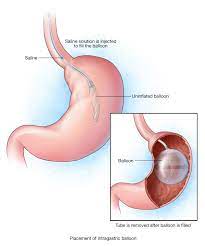Endoscopic Intragastric - Abu Dhabi - Dubai
Endoscopic intragastric procedures refer to minimally invasive surgical techniques that are performed within the stomach using an endoscope. These procedures are designed to treat various gastrointestinal conditions or achieve specific therapeutic goals.
One common example of an endoscopic intragastric procedure is the placement of an intragastric balloon. This procedure involves inserting a deflated balloon into the stomach through the mouth using an endoscope. Once inside the stomach, the balloon is filled with a sterile saline solution, occupying space within the stomach and creating a feeling of fullness. This technique is used as a temporary weight loss tool to help individuals with obesity lose weight before undergoing more permanent weight loss procedures.
Another endoscopic intragastric procedure is the endoscopic sleeve gastroplasty (ESG). It is a non-surgical alternative to traditional gastric sleeve surgery. During an ESG, the surgeon uses an endoscope to place sutures within the stomach, effectively reducing its size and capacity. This restriction helps patients feel fuller sooner when eating, leading to weight loss. ESG is typically performed on individuals with a body mass index (BMI) between 30 and 40 who want to lose weight but are not suitable candidates for bariatric surgery.
In addition to weight loss procedures, endoscopic intragastric interventions can be used to treat certain gastrointestinal conditions. For instance, endoscopic submucosal dissection (ESD) is a technique that allows the removal of certain early-stage gastrointestinal cancers or precancerous lesions from the stomach lining. During ESD, an endoscope is used to carefully dissect and remove the targeted tissue while minimizing damage to the surrounding healthy tissue.
Endoscopic intragastric procedures have several advantages over traditional open surgeries. They are less invasive, resulting in reduced postoperative pain, faster recovery times, and minimal scarring. Additionally, these procedures can often be performed on an outpatient basis, eliminating the need for a hospital stay.
Endoscopic intragastric procedures have several advantages over traditional open surgeries. They are less invasive, resulting in reduced postoperative pain, faster recovery times, and minimal scarring. Additionally, these procedures can often be performed on an outpatient basis, eliminating the need for a hospital stay.

